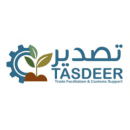Fabric waste, Sustainability and Re-use Expert
Fabric waste, Sustainability and Re-use Expert (Remote Position)
KEY INFORMATION
Job Title: Fabric waste, Sustainability and Re-use Expert (Remote Position)
Sector: Governance and Economic Reform
Position Type: Consultancy
Duration/Level of Effort: Between 10 and 20 person days, to be agreed.
Position Location: Remote (collaborating with national expert in Gaza)
Reports to: Deputy Team Leader
BACKGROUND
Tasdeer is a Trade Facilitation and Customs Support programme (2020-2025; £15m) funded by UK Aid from the British Government and implemented by a consortium led by Cowater International.
Our objective is to improve the Palestinian private sector’s competitiveness and Palestinian Authority (PA) capacity in trade, customs and import policy regulation and administration. We aim to increase sustainable private sector-led economic growth and job creation in the Occupied Palestinian Territories, supporting the PA’s fiscal sustainability while promoting equitable access to the benefits of increased trade and improved institutional capacity.
The garment and textile sector was a major industrial sector in Gaza in the 1990s, with about 900 factories employing 36,000 workers. With the second intifada and the imposed closure, the numbers decreased. By 2006, only 100 factories remained operational, employing 2,000 workers. The easing of the imposed closure in 2014 led to the re-establishment of export activities to Israel and the sale of products in the West Bank. This encouraged a steady increase in the number of factories operating. By 2015, the number of exporting factories reached 9, with a total export value of about USD 2,337,368, according to Palestinian Federation of Garment and Textile Association (PFGTA) records. Exports from this sector continued to rise, reaching 100 exporting factories in 2020 with a total value of USD 15,193,779. By 2021 this had increased to 226 factories employing 5,500 workers.
Currently, about 35% of textile exports from Gaza are to the Israeli market, while the remaining 65% of products exiting Gaza are sold in the West Bank market. Due to subcontracting arrangements with Israeli businesses, products sold in the West Bank have greater value-added to those sold in Israel. Manufacturers complete the entire production process for sale to the West Bank, from buying the fabric to delivering the finished product. For exports to Israel, manufacturers receive the design and fabric and provide the end product to Israel.
The garment and textile sector has lost much of its trained workforce due to the closure of Gaza’s borders with Israel in 2006. Loss of business and closure of factories has meant that few workers have been trained since 2006, and the current labour market lacks garment and textile production skills. This is considered a significant impediment to the growth of the sector.
The recent reclamation of export business and markets due to the easing of the closure has increased demand for high-skilled workers with exceptional technical skills. The extended closure period has depleted the pool of skilled workers and made it challenging for garment factories to find needed workers. The historical lack of business also means factories lack resources to invest in skilling new workers.
Although this is a sector that historically employed women and PwD, the current participation of women and PwD is estimated to be 5%. Women’s unemployment in Gaza is currently high, at 64%.
PFGTA has identified an opportunity in the sector to use produced fabric waste through recycling into new products. Garment factories in Gaza produce at least 3-5 tons per day of fabric waste, which is not utilized in the manufacturing process and is thrown away.
SUMMARY OF THE POSITION
Tasdeer is looking for a short-term (remote) consultant who will support a Gazan counterpart with a feasibility study for a Textile Waste Recycling Centre in Gaza. The centre will aim to create value-added products to sell them domestically or for export. Tasdeer is looking for an expert who can bring international best practices and perspective to the assignment.
There are several stages to this assignment, and the Expert will advise the National Consultant to achieve the following:
Review the current situation regarding textile waste produced by the Gaza Clothing Industry and determine the feasibility of recycling this waste into new marketable products.
Research potential markets for these recycled products.
Determine the requirements needed to establish a new business that would be an independent Textile Waste Recycling Centre.
Develop a business plan for the Textile Waste Recycling Centre
KEY RESPONSIBILITIES
The Consultant will review the raw material analysis, they will:
- Advise on developing a suitable questionnaire to use as a survey tool for the raw material assessment.
- Review and provide recommendations on the raw material assessment analysis conducted by the national consultant. This assessment measures raw materials' potential quantity and quality (fabric waste).
- The assessment will categorize the raw materials based on the quantity (kilos) broken down by Fibre Type (i.e. Cotton, Wool, Polyester, Viscose, Acetate, Mixed fibres such as Poly Cotton, Poly Wool, etc.).Establish the cost of obtaining these raw materials as likely input costs for new recyclable products
- The Consultant will conduct desk research for similar country Textile Waste Recycling initiatives, including newly developed products and highlight lessons learnt, if any.
- Based on the raw material assessment and cooperation with the national consultant, provide recommendations for the main products that can be produced based on best international practices.
- Based on the raw material analysis and identified products, establish the market potential in quantity, value and end markets. (Domestic and Export).
[Using the Consultant’s inputs from activities 1-4, the National Consultant will] Develop a Business Model and Plan. The international consultant will be expected to advise on and review the plan. This will include the following:-
Financial analysis: Provide support and guidance for the national consultant for the financial analysis and feasibility of establishing a new business to produce recyclable fabric products, including the expected return on investment. The recommendations should include the type of products, needed production technology, infrastructure, capacity and skills, and market potential (both domestic and/or export) of these expected/recycled products. The international consultant should provide input for the financial analysis to be conducted by the national consultant on the expected financial return from the products to be reproduced/recycled.
The business model should address the following:
- Business structure of the company, including the departments needed and the operating procedures that should be followed.
- Human resources needed for the company for management, producing the expected products and marketing.
- Business partnership: the type of agreement and relation that should be established between the intended company and the garment and textile factories that provides the raw material (waste fabric).
- Marketing: promoting and branding strategy that the company should follow.
- Establishment cost and financial strategy: a detailed budget of the projected cost for the establishment, operation cost, and financial modelling for the company's first five years.
No Task/ Deliverable
1 Report: Raw Materials Analysis
2 Report: Textile Waste Recycling Initiatives and Lessons Learned
3 Report: Product and Market Analysis
4 Report: Five-Year Business Plan
جميع الحقوق محفوظة لموقع جوبس.
JOB REQUIREMENTS
Requirements
- Masters degree in a related field (international development, environment, business etc)
- At least 15 years of experience in the relevant field
- Experience with topics related to garment waste and recycling management;
- A proven track record of organizational development;
- Experience in stakeholder engagement, consultation, and facilitation;
- Training skills, including participatory training in group settings. Training and consultation experience utilizing a translator or interpreter is an added plus;
- Self-motivated, proactive, detail-oriented, mature, professional team player, who is a strong people person and communicator, with good inter-personal skills;
- Ability to address issues, challenges, questions, and concerns in a professional, respectful, logical, and timely manner;
- Works well in a multi-cultural setting;
- Well-developed writing skills in English
- Good computer skills in MS Office.
GEOGRAPHIC COVERAGE AND DUTY STATION
Remote.
START DATE
February 1st or as soon as possible.
APPLICATION PROCESS
Candidates are encouraged to apply as soon as possible, or by Wednesday 18th January 2023.
Candidates must submit the following to be considered:
- A full CV
- A cover letter (two page limit, A4) which explains their suitability for the role.
For your application to be considered, please upload your documents as follows: Candidate Last Name, First Name, date, Title of the Position.
Cowater International is an equal opportunity employer, basing employment on merit and qualifications as they relate to professional experience and position expectations. Cowater does not discriminate against any employee or applicant on the basis of race, religion, sex, gender identity, disability, age, or any other basis protected by law.
We thank all applicants, however only those shortlisted will be contacted.
ABOUT US
With more than 35 years’ experience, Cowater International is Canada’s global leader in management consulting services specializing in international development and has managed the implementation of over 800 projects in more than 80 countries around the globe. We work with governments, partner organizations, communities and civil society to design and implement sustainable solutions that generate lasting social, financial and environmental impacts. Our adaptive approach to management has led to our award-winning work and recognition as one of Canada’s Best Managed Companies in 2017, 2018, 2019, 2020 and 2021. Headquartered in Ottawa, Canada, Cowater International also has corporate offices in Montreal, Quebec; London, United Kingdom; Nairobi, Kenya; and Brussels, Belgium, in addition to project offices in a wide variety of other locations across Sub-Saharan Africa and Asia.
We thank you for your interest in building a better tomorrow with Cowater International.










